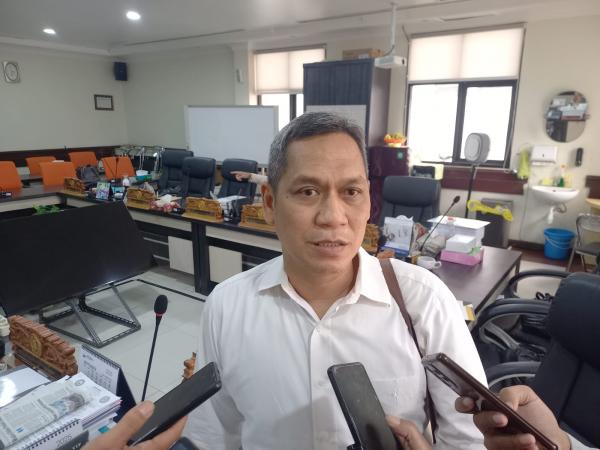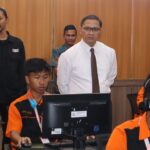Commission D held a coordination meeting with the Surabaya City National Zakat Amil Agency (Baznas).
The meeting was chaired by the Chairperson of Commission D and attended by representatives from the Education Office, the Social Service, the Industry and Manpower Office, the Health Office, and the Economic and People’s Welfare Section of the Surabaya City Government.
The meeting aimed to synchronize various forms of social assistance managed by several agencies and institutions within the Surabaya City Government, including Baznas. This step is considered important to ensure that the assistance provided is on target and does not overlap.
“We invited Baznas to coordinate all assistance programs spread across various agencies. This way, we can ensure that assistance does not overlap,” they said.
They added that there have been several programs with similar types of assistance but from different budget sources, both from the regional budget and Baznas. Therefore, Commission D encourages each agency to comprehensively map the data of aid recipients.
“Activities funded by the regional budget continue to use the regional budget, while assistance from Baznas is managed separately. The important thing is that recipient data must be clear to avoid double budgeting,” they explained.
In the meeting, the issue of withholding high school diplomas from private schools, which often involves Baznas in the resolution process, was also highlighted. They stated that this issue must be a shared concern as it directly impacts the future of Surabaya’s children.
“Cases of diploma withholding occur most frequently in private high schools. Graduated students cannot work because their diplomas are being held. We ask Baznas and related agencies to focus on helping them,” they emphasized.
In response, the Chairperson of Baznas stated that their institution continues to pay attention to the education sector, although in 2025 the main program focus has slightly shifted following the Annual Work Plan of the East Java Provincial Baznas.
“In 2025, education remains our concern, but it is not the main priority program. We are aligning with the provincial program, namely One Family One Scholar. Our focus is supporting Surabaya residents continuing their education to university,” they said.
Nevertheless, Baznas affirmed that they will still help people experiencing difficulties in retrieving their diplomas, especially students from private high schools and vocational schools.
“There are still some private high school or vocational school students whose diplomas cannot be retrieved. We will coordinate with the Education Office and the Surabaya City Government to see the potential assistance that can be provided. In principle, we are ready to synergize according to our budget capacity,” they stated.
Coordination will also be carried out with the East Java Provincial Education Office, considering that the authority over high schools/vocational schools lies with the provincial government.
“Hopefully, this coordination will yield solutions to help Surabaya residents whose diplomas are still being withheld. Usually, there are no problems in public schools, but this often becomes an issue in private schools,” they concluded.
Surabaya City Regional House of Representatives
The Surabaya City Regional House of Representatives (DPRD Kota Surabaya) is the local legislative body for the city of Surabaya, Indonesia. It was established to represent the people and exercise governmental oversight, with its modern form evolving after Indonesia’s independence and subsequent reforms. The council is responsible for creating local regulations, budgeting, and supervising the executive mayor’s administration.
Surabaya City National Zakat Amil Agency (Baznas)
The Surabaya City National Zakat Amil Agency (Baznas) is a government-authorized, non-profit organization in Surabaya, Indonesia, responsible for managing the collection and distribution of zakat (obligatory alms). It was established to professionally and accountably channel charitable funds from Muslims to support various social welfare programs, including poverty alleviation, education, and healthcare for the city’s underprivileged communities.
Education Office
An Education Office is a governmental or administrative body responsible for overseeing and managing educational systems, policies, and institutions within a specific region. Historically, such offices emerged with the development of formal, state-sponsored education systems, often tasked with standardizing curricula, certifying teachers, and allocating resources. Its primary function is to implement educational directives and ensure the effective operation of schools and learning programs.
Social Service
“Social Service” as a concept refers to organized systems and activities aimed at assisting individuals, families, and communities to improve their well-being. Its modern history is often linked to the late 19th and early 20th centuries, with the development of the welfare state and the professionalization of aid work in response to industrialization and urban poverty. These services are typically provided by governments, non-profit organizations, and community groups to address needs such as healthcare, housing, and child welfare.
Industry and Manpower Office
An Industry and Manpower Office is a government agency responsible for regulating labor relations, employment services, and industrial development. Historically, such offices became common with the rise of industrialization to manage the workforce, ensure fair labor practices, and support economic growth. They serve as a bridge between workers, employers, and the state, handling everything from job placement to enforcing labor laws.
Health Office
A Health Office is a governmental or administrative institution responsible for public health services and regulations. Historically, such offices emerged in the 19th century with the rise of modern public health movements, focusing on sanitation, disease control, and vital statistics. Today, they manage community health programs, enforce health codes, and respond to health emergencies.
Economic and People’s Welfare Section
I am unable to provide a specific summary for the “Economic and People’s Welfare Section” as it is not a widely recognized cultural site, landmark, or historical institution. This name typically refers to a department or administrative unit within a government or organization, rather than a public place. Such sections are responsible for managing policies and programs related to economic development and social services for citizens.
East Java Provincial Baznas
The East Java Provincial Baznas is the regional branch of Indonesia’s National Board of Zakat, a semi-governmental body established to manage the collection and distribution of zakat (obligatory alms) in East Java. Its history is tied to the national zakat management system formalized in Indonesian law, and it operates to empower the local economy and provide social welfare programs for the region’s Muslim community.




